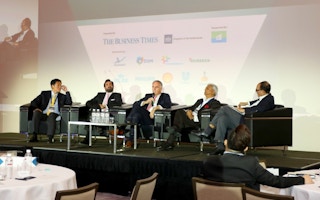While there is some concern in corporate circles that sustainability is not high up on the list of government priorities in Asia, business leaders agree that they cannot afford to wait for “all ducks to line up” and that it may be up to them to do more to protect the environment.
At a conference held in Singapore at Grand Hyatt on Tuesday, heads of Singaporean and Dutch companies agree that it may be up to them to prioritise sustainability, both as individual companies and as a sector.
“I think it’s great to have governments supporting this concept and everybody behind this but that perfect day is difficult to fathom,” said Gajendra Singh Sareen, chief executive officer of Omni United, a tyre manufacturer based in Singapore.
“You will never get your ducks all lined up. I think corporations have to get their act together and do what is right.”
Sareen and other panelists were addressing a conference “Leadership in Sustainability” organised by The Business Times and the Dutch embassy to commemorate the late Dutch economist Dr. Albert Winsemius (1910-1996).
He played a key role in setting the economic foundations of Singapore since the early days of independence, and was also an advisor to the Singapore government for more than two decades.
More than 200 business and government leaders attended the half-day conference, where delegates discussed the private sector’s role in improving sustainability in business and the economy.
Omni, for example, works with shoe-maker Timberland to refashion discarded tyres into shoe soles, an idea that Omni says could potentially revolutionise the tyre industry, which discards literally hundreds of millions of tonnes of used tyres a year. Each tyre can take up to 3,000 years to degrade, Sareen said.
Using this method, Omni not only makes money selling the old tyres to Timberland, it also plays its part as a responsible corporate citizen, he added.
“You can either choose to do the right thing without looking at the commercial side or look at the commercial side and do something. It’s a question of going about sensibly doing the right thing.”
Indeed, the corporate sector has the power to make a difference in protecting the environment, ahead of governments in Asia, said Atem S. Ramsundersingh, chief executive officer of WEnergy Global, a Singaporean firm specialising in renewable energy.
“
You will never get your ducks all lined up. I think corporations have to get their act together and do what is right.
Gajendra Singh Sareen, chief executive officer, Omni United
This is because the average government official in Asia does not have any awareness of sustainability or clean energy, he said, citing his own experience of talking to officials in the Phillipines about the benefits of installing solar panels on rooftops.
“You can save hundreds of thousands of litres of gasoline by putting solar panels on the roof,” he told the audience. “But you ask any minister in the philippines why (you can’t do more), and the minister will tell you, “don’t know.”
It is similar with other governments, Ramsundersingh added, drawing from his experience in working on renewable energy projects as an employee of the World Bank in Washington.
While the four-men panel shared some concern that governments are not doing enough to impose regulations requiring companies to implement sustainability measures, at least one of them is quite optimistic.
Referring to the United Nations climate change summit to take place in Paris in December, Ong Ye Kung, director of group strategy at Keppel Corporation, said the question is how ambitious the deal will be.
Keppel is a Singapore-based conglomerate with businesses from building offshore oil-rigs to property development.
The December meeting, to be attended by the world’s top decision-makers from government, business and civic society, aims to achieve a legally binding and universal agreement on climate change. If successfully drafted, it will be the most far-reaching global environmental agreement ever.
“I think it’s a good start. And from there, we can develop more rules, find targets,” Ong said. “Various countries will follow that, and companies will fall in line and start to treat climate change and sustainability in a very serious way. So I’m quite optimistic.”
However, any change will also take time, said Roelof Westerbeek, President of Dutch firm DSM Engineering Plastics.
The plastics business is heavily dependent on fossil fuels, with close to 100 per cent of all products made from oil and oil derivatives, he said. While the industry wants this to change this, progress is likely to be slow.
“We know that 50 years from now (the amount of plastic that’s made from oil) might be only 10 per cent, but it’s going to take a lot of time, step by step, for us to be able to move in the right direction,” Westerbeek said.
“But I think we need to have faith that it will happen. We cannot give up and we also cannot afford to wait until the world has as bad a pollution problem as Beijing, ” he said, referring to the poor air quality in the Chinese capital.
At the end of the day, change will happen if “it makes sense”, Sareen said. This includes not just cleaning up the environment but also making sustainability part of the DNA of a business, whether or not there’s government support.
“I think corporations need to stop cribbing about governments not supporting something, get together and give the marching orders and keep going,” he said. That’s when real change will truly happen.

















